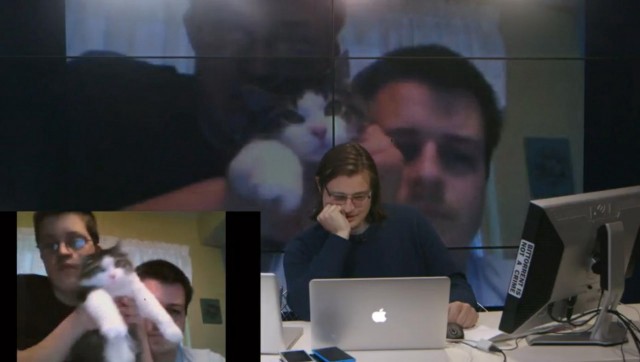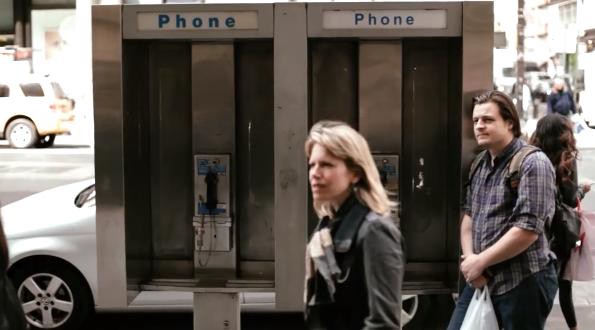A Year Without Internet
by Hamza Shaban

Highly educated Americans tell the world that young people are increasingly distracted or emotionally incompetent due to incessant pointer-clicking and unrelenting thumb-pressing. From the stuffed genre of airport-friendly socio-criticism, we’ve learned that networked technologies are making us lonely and small-minded. Apparently no one has ever sent Nicholas Carr, author of The Shallows: What The Internet Is Doing To Our Brains, or Sherry Turkle, of Alone Together: Why We Expect More From Technology And Less From Each Other, a tastefully brief Snapchat. In their best-selling sermons, “the Net” is the devil. Search engines, hyperlinks, and texts ensnare our intellect with the seductive fork tongue of reptilian temptation.
From these admired and popular writers we get big questions like Is Google Making Us Stupid?, and oh-so-profound op-eds like The Flight From Conversation, in which we’re told that our stifled concentration and stalled sociability stems from frenetic web browsing and Facebook’s trivial pursuits. This helps to explain why Paul Miller, writer for The Verge — in an effort to reclaim his humanity and become one-with-the-world — staged a 365-day-long experiment: absolutely no Internet.
In April of 2012, Paul decided to unplug. “I was 26 years old and burnt out,” Paul wrote when he returned.”I wanted a break from modern life — the hamster wheel of an email inbox, the constant flood of WWW information which drowned out my sanity. I wanted to escape.”
Beginning May 1, for one year, Paul would say no to forum-link-binging and cat-vid-gorging. He would forego text messaging and renounce Twitter.
And then, he returned. What soon became clear to Paul (around his fourth month) and for the reader (in the first few sentences of his homecoming essay) was that his paralyzing anxiety and enveloping sense of dejection had little to do with his Reddit overuse.
That Paul did not emerge from a mountain of seclusion like Muhammad or Zarathustra, that he did not return a walking Deepak Chopra of prophetic wisdom and Gandhian patience, is not so surprising. In fact, Paul’s failed experiment helps to refute the Internet fear mongering that has propelled the notoriety of the professional “thinking about the Internet” class.
In “Finding Paul Miller,” a short documentary made by Paul’s coworkers at The Verge, we are encouraged to dispatch the gimmicky notion that the “Internet” has a specific purpose and ideology. Instead we’re allowed to marinate in Paul’s melancholy and celebrate his humble attempt to self-cultivate and improve. With just enough lens flares and a moody, instrumental soundtrack reminiscent of an Explosions In The sky Pandora station, we hear Paul’s vulnerability: “There’s deeper, deeper reasons for most of my problems that really didn’t have a lot to do with the Internet — they just manifest differently on and offline.” Later, he confesses: “Some of the loneliness and boredom that came from leaving the Internet was really instructional because it just let me know that my problems are much more internal than external.”
Rich with piercing self-reflection, Paul is all too aware that his Wi-Fi-less year was heavy on the Xbox but light on epiphanies. (“I ended up playing a lot of videogames,” he said.) The first few months of his journey inspired a personal renaissance: a mending of relations with his sister, a torrent of creative writing, and an embrace of serendipitous, boyish amusement. But his initial flurry of unencumbered human flourishing was pulled down by the gravity of the mundane. “By late 2012,” Paul tells us, “I’d learned how to make a new style of wrong choices off the internet. I abandoned my positive offline habits, and discovered new offline vices. Instead of taking boredom and lack of stimulation and turning them into learning and creativity, I turned toward passive consumption and social retreat.”
During his project Paul never finished that novel he’d been working on for five years. Nor did the journalist compose a book reporting his voyage through networked abstention. “I didn’t want to meet this Paul at the tail end of my yearlong journey,” he says, without regret, but with some disappointment.

In Paul’s version of There and Back Again, it’s telling that along the way our young hero meets Nathan Jurgenson, a sociologist and strident critic of Sherry Turkle, Nicholas Carr, and every other ponderer who views the Internet as a destroyer of brains and community and life. Jurgenson, like Evgeny Morozov and Zeynep Tufekci, seeks to undermine and alter our common and unuseful ideas surrounding networked technology. We tend to think that the offline and the online are of two different realms, with sign-in screens acting as a portal. On the one side: babble, blog posts, centrifugal bumble puppy, Tinder, disengaged tweens, the Kardashians, hyper-regressive attention spans, Facebook farce, The Matrix. On the other: books, truth, orgasmic eye contact, the Socratic Method, a hike through Canadian forests, reality, patience, conversations with Oprah.
From Jurgenson, Paul learns to articulate what his own experiment was revealing: that while virtual worlds are different from analog ones, our lived experience has always been an entanglement of technologies. Logging off Facebook for 12 months didn’t make Paul more real, it just altered his ability to communicate with friends and loved ones. In a similar vein, Tufekci, in her criticism of Turkle, reminds us that feelings of alienation need not be traced to social media. She points to actual menaces, like soul-crushing consumerism and isolating suburban sprawl, in addition to a stack of social science that show how people use digital networks to maintain existing relationships and to forge new ones.
In his own assault against thinking of “the Internet” as a monolithic technology that has its own goals and predetermined features, Morozov urges against Nicholas Carr’s “the Net will eat your mind” thesis. Since ebooks, Instapaper, #longreads and ad-free magazines exist in digital space right alongside the circus of diversion, it would make more sense to consider the diverting practices of particular content providers rather than encourage us all to become Paul, to renounce what they used to call cyberspace.
On the evening of April 30, 2013, The Verge hosted a live podcast to capture Paul’s glorious re-entanglement with the Web. Midnight marked a full year. Armed with champagne flutes and a Google doc of “things Paul should click on when he comes back to the Internet,” the first of Paul’s connected minutes were spent attempting to reclaim forgotten Twitter and Facebook passwords. In what seemed like a bachelor party of friendly humiliation and hearty congratulations, Paul’s Verge coworkers took him on a guided meme-tour of hilarious/terrible YouTubes he’d missed: Chuck from the Bronx’s ghost pepper challenge, Bane rapping, that new one where the cat licks a vacuum cleaner hose.
Amid the shenanigans, the year’s trial did not so much herald the return of the Internet as it did renew Paul’s obligations to his sister and family, to his craft as a writer, and to his positive intentions.
With just minutes remaining on the podcast, Verge editor-in-chief Josh Topolsky asks if Paul has one last thing he’d like to share with the world. Paul pulls up an old video from his Facebook.
“This was the first thing I wanted to do on the Internet,” he says.”It’s just me and my little brother.” It’s a playful little movie of him staring at a computer, while his little brother dances and surrounds him with methods of distraction: books, guitars and a cat. While the video plays on Facebook on one of the many laptops and devices before Paul, it’s also broadcast behind him on a giant screen. The video is also boxed, in-screen, for the viewer at home. Paul doesn’t take his eyes off the movie. Sometimes he seems mournful, sometimes he laughs. When it’s over, the seven men in the studio watching him watch the video of himself watching his computer applaud.
Hamza Shaban’s tech writing has appeared in Cyborgology, The American Prospect and The Root. He’s on Twitter.
Man Finds Album Underwhelming
“When people say it makes more sense when you see them live, that’s usually a surefire sign that their record is going to suck.”
New York City, May 5, 2013

★★★ There was no relaxing into the morning, despite the brightness. It was just not warm — it was brisk, even, or whatever the springtime equivalent of briskness might be. A woman huddled in her cardigan out in the misjudged chill. Later on, there were scarves out, all hope or pretense abandoned. Still it was clear, though. The toddler went out for a walk and came back sweaty. Late in the day, a yellow-white haze draped over the river. An American flag, backlit, flowed from the parapet of a setback on a Trump building. An airplane coming in was a fleck of reflected light too bright to resolve into a shape, a shimmer like a water strider’s footprints crossing the sky.
The Internet Continues To Collapse Into Itself

“A poster going by the screennames ‘TimeTravel_0’ and ‘John Titor’ on a variety of message boards, beginning with the forum at the Time Travel Institute, claimed he was a soldier sent from 2036, the year the computer virus wiped the world. His mission was to head back to 1975 in order to snatch-and-grab an IBM 5100 computer, which had the necessary equipment to fight the future virus…. Over the next four months, Titor responded to every question other posters had, describing future events in poetically-phrased ways, always submitted with a general disclaimer that alternate realities do exist, so his reality may not be our own. In between dire urgings to learn first aid and stop eating beef — Mad Cow was a serious threat in his reality — Titor provided a number of technical specs regarding how time travel worked, with overly complex algorithms and grainy, hard-to-make-out photos of his actual machine…. On March 24, 2001, Titor offered his final piece of advice (‘Bring a gas can with you when the car dies on the side of the road’), signed off forever, and returned home. He was never heard from again.”
— I hate to break it to you, but the future is going to be a LOT more annoying than this.
I Just Learned How To Change The Subject Line In The New Gmail
This scathing denunciation of the new Gmail interface can also be used as a handy tool for those of us who have been baffled by it so far but can’t be bothered to figure out how to use it.
Witness Gun History
“In the hands of its 25-year-old creator, Texas University law student Cody Wilson, the gun looks like an absurdly large Lego piece. Called the liberator, it is very real, very deadly, and very important: It is the first gun printed entirely with 3-D-printed parts (except for a single common nail that can be bought at any hardware store) and it is not hyperbole to call its firing a historical event.”
— MAN: Remember the historic moment when that guy fired the first 3-D-printed pistol?
[Sound of gunfire.]
WOMAN: [Dies.]
MAN: Oh, sorry, I keep forgetting that I need to be more quiet now that everyone has their own little plastic arsenal of deadly weaponry and we live in a society where we are hunted down indiscriminately. I guess the sound of my voice gave our position away. Now I suppose I am the last person who can recall that historical event.
[More gunfire.]
MAN: Well, that sucked. [Dies.]
Are We Not Each A Customer Whilst We Are Using The Restroom?

Not that you asked, but when it comes to the more Labor-Intensive aspect of availing myself of the Facilities, as it were, I generally prefer to handle my Business, if you will, at home, in the privacy therein and so forth. Every once in awhile, in my workaday world, in an extreme circumstance, I may find a need to be alone with my thoughts while in an office environment, uncomfortable as I may be with the entire process. It helps to read most of this in a phony English accent, I think, like one of those powdered-wig lawyers on Public Television. Go on, start over and see if it helps. No? Worse? Yeah, sorry, at this point, I am starting to hallucinate-smell some of those “air freshener” things in Public Restrooms, bleagh. Anyway.
I’m not trying to bring this up to make anybody feel bad or anything, it’s all natural and whatever, and when you feel the need, you should be Taking Care of Business, don’t put any additional strain on yourself, you know? It’s not healthy. I’m addressing the worst, emergency-level aspect of “Needing a Loo,” in the words of the “Patsy” character on “Absolutely Fabulous,” which might be why I think about going to a Public Restroom in an English Accent, I dunno. I don’t think the subject has ever come up on “Doctor Who,” you know? It’d probably just be a sound-effect. Maybe on “Downton Abbey,” but I haven’t watched too many of those.
An article like this — “The Last Office Taboo for Women: Doing Your Business at Work” — ,which centers on equal rights, does not address the fundamental problem, which is one should resist employing an office bathroom for the more, shall we say, prolonged aspects of bathroomery in an office situation unless it’s an emergency, or for medical reasons of infirmity, or you’re there in the office for ridiculous amounts of time over a “normal” workday because you need to keep your job. You’re supposed to be on a schedule, for your health.
If you are out there in The World, and you need to excuse yourself, then you have to find a place you can count on as available and serviceable. Personally, if you don’t have any reliable options, I think you should almost always try and find a McDonalds, because they have the Minimum Requirement of Lavatory, in my opinion. I’ve seen a lot of WCs at places such as, but not limited to: Arby’s, Taco Bell, Denny’s, Roy Rogers, Pizza Hut, Burger King, Wendy’s, Kentucky Fried Chicken, Arthur Treacher’s, etc., and I think McDonalds provides in general, one of the least horrifying places to unwind, or whatever. I have officially failed to keep up the euphemisms.
This country does not have an official system of Public Restrooms unless you are driving on a superhighway, and it is one of the things that separates us from the Old World, where they have been dealing with these issues for what, millions of years? Europe is old, man, they have mastered Life in all of its disgusting aspects and they don’t get all weird about it like we do here, except of course with our dogs, which in America get to go wherever they want and you’re an animal hater if you complain about somebody with their damn dog soiling your lawn.
Look, the most important thing here is I am here to help. I have Unlimited Bathroom Credit at McDonalds. I have eaten at McDonald’s almost as many times as they have hamburgers served, and I contend that gives me Bathroom Credit, because I have been to McDonald’s bunches of times and never hit the restroom, and I’m not even counting the drive-thru, I’m talking about in-store appearances, so even if you have never gone to a McDOnald’s you should consider yourself my guest if you ever need a Necessary Room in the civilized World, OK? I might get some cards printed up.
Mr. Wrong can converse with you via many medias. Unnecessary signage photo by “weegeebored.”
British People Do Floors Wrong
“When the US photographer Ormond Gigli described the composition of one of his pictures in which women appeared in the windows of a multi-storey building (My best shot, 2 May, page 19, G2), some readers were left wondering by the reference to ‘my wife (second floor, far right), the supervisor’s wife (third floor, third from left)’. To clarify: the references to floors were in US English; in the photograph, Ormond’s wife was on what would usually be known as the first floor in British English, and the supervisor’s wife on the second floor.”
Ice Cream Expensive
“Welcome to the historic centre of Rome, in the year 2013. It was here at the top of Via della Vite, just off Piazza di Spagna, that four holidaymakers from Birmingham nearing the end of their six-day trip to Rome bought the ice creams with the nasty after-taste. Four ‘wrap-around’ cones ‘with two wafers and three flavours’ cost €16 each for a total of €64.”
— I dunno, I might pay $20 for an ice cream if it meant I was eating it in Rome. I mean, probably not, that’s just crazy, but in the scheme of things there are a lot of less palatable options.
